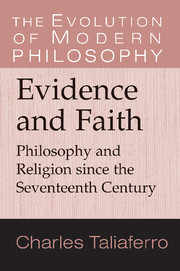Book contents
- Frontmatter
- Contents
- Acknowledgments
- Introduction
- 1 The Sovereignty of the Good in Seventeenth-Century Philosophy of Religion
- 2 Cartesian Philosophy of Religion
- 3 The Ascendancy of Rules of Evidence in Early Modern Philosophy of Religion
- 4 Humean Philosophy of Religion
- 5 Kantian Philosophy of Religion
- 6 Religion and the Philosophical Gods and Giants
- 7 Continental and Feminist Philosophy of Religion
- 8 Five Major Moves
- 9 Religions, Evidence, and Legitimacy
- Appendix A A Guide to Further Study
- Appendix B Select Contemporary Philosophers
- Select Bibliography
- Index
Introduction
Published online by Cambridge University Press: 15 December 2009
- Frontmatter
- Contents
- Acknowledgments
- Introduction
- 1 The Sovereignty of the Good in Seventeenth-Century Philosophy of Religion
- 2 Cartesian Philosophy of Religion
- 3 The Ascendancy of Rules of Evidence in Early Modern Philosophy of Religion
- 4 Humean Philosophy of Religion
- 5 Kantian Philosophy of Religion
- 6 Religion and the Philosophical Gods and Giants
- 7 Continental and Feminist Philosophy of Religion
- 8 Five Major Moves
- 9 Religions, Evidence, and Legitimacy
- Appendix A A Guide to Further Study
- Appendix B Select Contemporary Philosophers
- Select Bibliography
- Index
Summary
Philosophy of religion is, I believe, one of the most fascinating and profound areas of philosophy, in part because it asks basic questions about our place in the cosmos and about the possibility of a reality that may transcend the cosmos. Is the cosmos created or uncreated? Alternatively, should the natural world itself be thought of as sacred or divine? What is the relationship between (apparently) competing concepts of God found in different religions and even in the same religion? Is a Buddhist concept of the self or a Christian view of the soul credible in light of modern science? A philosophical exploration of these and other questions requires an investigation into the nature and limits of human thought.
Philosophy of religion is also a robust, important undertaking due to its breadth. Religious traditions are so comprehensive and all-encompassing that almost every domain of philosophy may be drawn upon in the philosophical exploration of their coherence, justification, and value. I can think of few areas of philosophy that lack religious implications. Any philosophical account of knowledge, values, reason, human nature, language, science, and the like will have a bearing on how one views God or the sacred; religious values and practices; the religious treatment of birth, history, and death; the varieties of religious experience; the relationship between science and religion; and other substantial terrain. At least two other factors contribute to the importance of philosophy of religion.
- Type
- Chapter
- Information
- Evidence and FaithPhilosophy and Religion since the Seventeenth Century, pp. 1 - 10Publisher: Cambridge University PressPrint publication year: 2005

